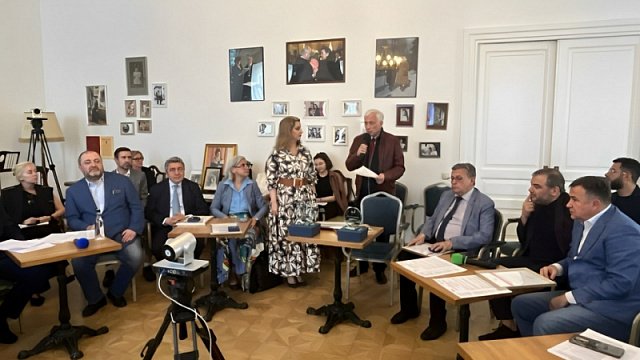05.06.25
11:45
Russia discusses countering terrorism in media space
Experts discuss current challenges and digital tools for combating radicalism
A round table discussion “Countering the ideology of terrorism in the media: the potential of artificial intelligence (AI) for detecting radical content” was held in Moscow.
The discussion was attended by representatives of international organisations, government agencies, the media, the expert community, and former law enforcement officials.
Roman Zezyulia, Deputy Director of the Department for State Support of Media Development at the Russian Ministry of Digital Development, Communications and Mass Media, thanked the organiser, the International Academy of Television and Radio and the Russian Ministry of Digital Development, Communications and Mass Media:
“The topics change, but the format of the round table remains the same – intimacy, the opportunity to speak and be heard – this is the strength of such events,” he said.
Vladimir Kuznetsov, Director of the UN Information Centre in Moscow, emphasised that the use of artificial intelligence in the fight against terrorism is a complex but important issue that can unite states.
“The nature of the discussion and the goals set by its participants are undoubtedly aimed at bringing people together. […] I remain optimistic and truly hope that common sense will prevail. But for it to prevail, everyone must join forces,” he said.
Yulia Nefedonova, Assistant Professor at the Faculty of Journalism at Moscow State University (MSU), presented a study showing how technology recognises the emotional tone of messages and explained why it is useful to apply artificial intelligence.
“Texts distributed through radical channels often have a very professional informational and psychological impact. Users are far from immediately able to recognise the problem of radical content and distinguish it from neutral content, and sometimes they cannot do so at all,” she said.
Yulia Nefedonova noted that the volume of information no longer allows us to rely solely on manual monitoring.
“We started using the BERT neural network to identify signs of social conflict in media content. The model was unable to classify the types of conflicts, but it coped successfully with the task of binary analysis, with an accuracy of about 70 per cent,” she said.
In turn, Maria Anikina, Associate Professor at the Faculty of Journalism at Moscow State University, continued the theme, emphasising the importance of automated technologies in information analysis. She spoke about her research, which was based on the study of more than 300,000 social media posts over a month.
According to her, modern tools and programming environments make it possible to expand the capabilities of analysing large amounts of text information compared to traditional manual research.
International context: how BRICS countries are fighting digital extremism
Egypt: law, prevention and religious education
According to a study presented to the Egyptian Senate Committee, the country is implementing a comprehensive strategy to combat cyberterrorism.
Egypt ranks 23rd out of 155 countries in the Global Cybersecurity Index (GCI), reflecting the effectiveness of legislative and institutional measures.
The state relies on international agreements, including the UN Convention on Combating Terrorism and the Arab Agreement on Combating Cybercrime.
Particular attention is paid to educational work. The Ministry of Religious Affairs and Al-Azhar University have published more than 370 books in different languages, updated their training programmes and actively interact with more than 100,000 mosques. Dar Al-Ifta (one of the key Islamic religious institutions in Egypt) has been monitoring extremist fatwas since 2014 and Islamophobia since 2015. The fight against extremism in Egypt is a task for the whole society.
India: call for joint action
A delegation from the Indian Parliament, led by MP Shashi Tharoor, proposed that Brazil conclude a cooperation agreement on combating terrorism.
India is also stepping up cooperation within the Shanghai Cooperation Organisation (SCO). Recent talks between Indian Foreign Minister Subrahmanyam Jaishankar and his Iranian counterpart Abbas Araghchi confirmed this course of action.
Brazil: strengthening coordination within BRICS
In April 2025, Special Assistant to the Brazilian President for International Affairs Celso Amorim expressed support for cooperation in the fight against terrorism in BRICS countries.
Among the initiatives there are:
-
creation of a national register of terrorist organisations;
-
tightening control over terrorist financing, including expanding the powers of the Council for Financial Activities Control (COAF).
Amendments equating cyberterrorists with terrorist organisations are being discussed in parliament.
China: for universal standards and rejection of politicisation
During a meeting of BRICS Ministers on security issues, Chinese Foreign Minister Wang Yi said that the association’s members should oppose all forms of terrorism.
He called for the creation of universal global rules, especially in the field of digital security.
According to Wang Yi, the politicisation, militarisation and fragmentation of cyberspace undermine international stability. China promotes a legal approach, referring to an official document that describes a comprehensive anti-terrorism system:
-
special amendments to the Criminal Law;
-
the Anti-Terrorism Law;
-
laws on national and cyber security, and anti-money laundering.
China emphasises the importance of respecting human rights in the fight against terrorism.
According to Wang Yi, the fight must be conducted strictly on a legal basis, without attempts to politicise the issue and use it to put pressure on other countries.
Photo: International Academy of Television and Radio / Yana Dorohova
Back


